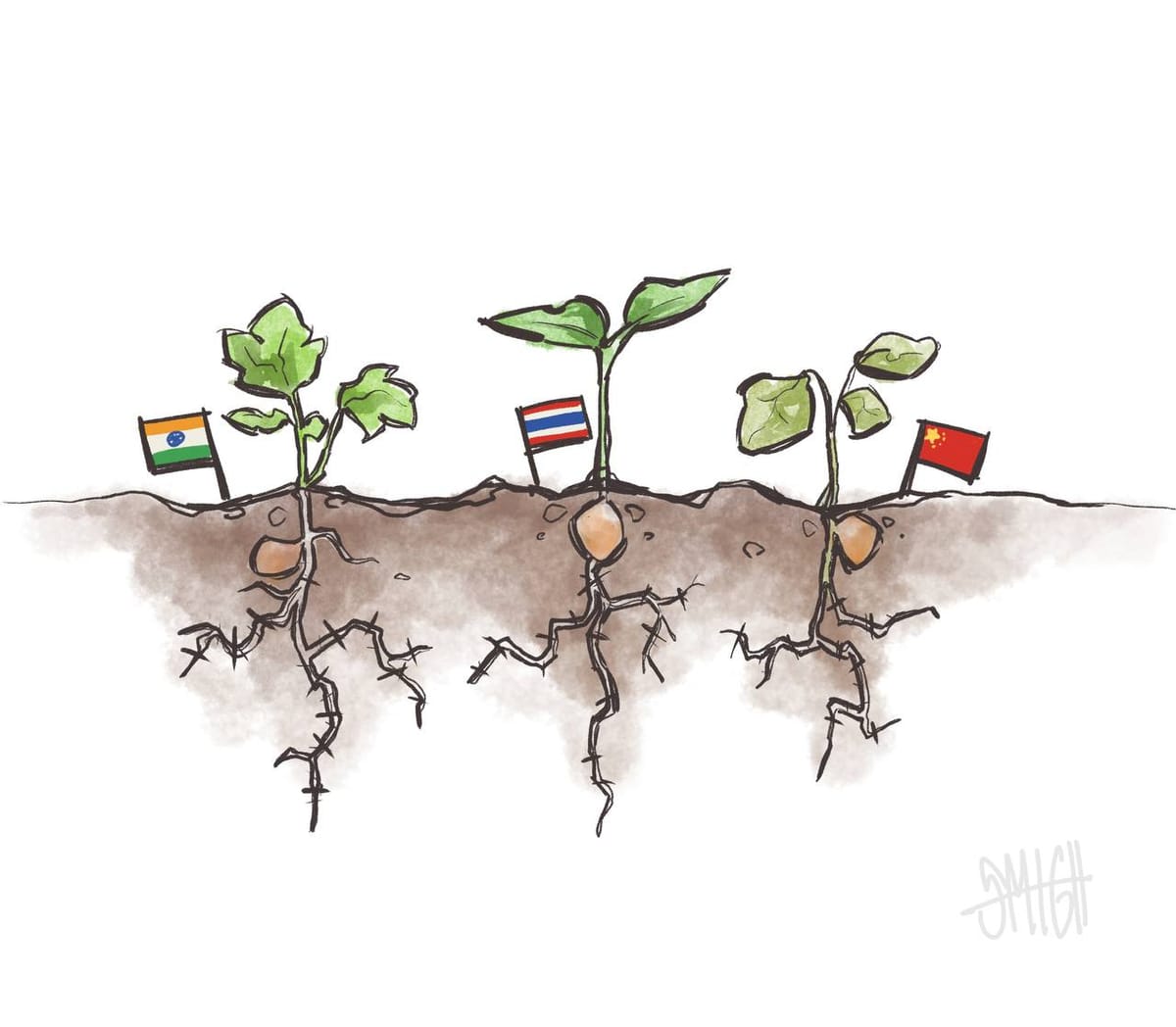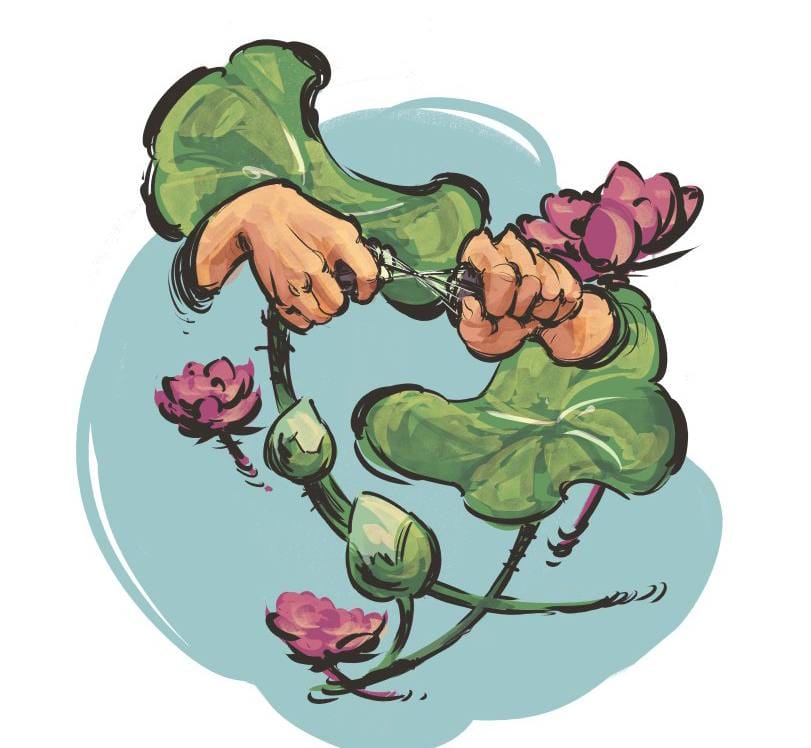
If you're planning to visit the United States, you can't bring tomatoes from Inle Lake as a gift. At the airport, when customs officials spot tomatoes, you'll likely meet an agricultural expert from U.S. Customs and Border Protection (CBP). Even though it's just a tomato, without their explicit permission, you can't bring it in. This is because foreign seeds and species are strictly prohibited in the U.S.
It's not just the United States; many countries worldwide prohibit the import of seeds and foreign produce. The reasons include preventing the introduction of pests and diseases from outside their borders, controlling invasive species, and ensuring food safety.
However, in Myanmar, we're witnessing a different kind of problem. Bitter gourds are no longer bitter, large onions the size of a palm have replaced traditional varieties, we're eating hot but not spicy chilies, golden apples have taken over from traditional custard apples, watermelons are red but not sweet, and Chinese and Taiwanese water spinach have replaced native red water spinach.
Have you ever looked at these fruits and vegetables and thought something must be seriously wrong somewhere? If you have, it's not paranoia. Let's call it justified vigilance.
If the seed isn't right, the plant won't thrive
Myanmar is an agriculture-based country where you can grow everything from rice and corn to chili peppers. While some produce is consumed domestically, a portion is also exported. However, don't assume Myanmar has a wide variety of seeds. In fact, Myanmar imports seeds for most of its crops, primarily from Thailand, China, and India. Foreign seeds are flooding into Myanmar en masse.
Some imported seeds can be reproduced locally for planting, while others cannot. Most of the imported seeds are F1 hybrids, which can't be reproduced.
F1 hybrid seeds can't be saved and replanted. This means farmers have to buy new seeds every year. This is a major problem for Myanmar's agriculture.
Seeds are this important. That's why there's a Myanmar saying: "If the seed isn't right, the plant won't thrive." Let's take a closer look at the crucial issue of seeds.
What are seeds?
Seeds are defined as plant materials produced for cultivation that meet specific quality standards for each seed grade, designed to maintain the original genetic and physical characteristics of the crop.
There are basically three types of seeds:
- Open Pollinated Seeds
- Heirloom Seeds
- F1 Hybrid Seeds
Types 1 and 2 refer to native varieties, or in other words, parent seeds. They pollinate naturally, produce seeds, and these seeds can be replanted. They can be preserved through agricultural methods and passed down through generations. Type 3 are hybrid seeds, or in other words, foreign seeds.
For simplicity, we can divide seeds into two categories: native varieties and hybrids. Let's look at each of these.
Native Varieties
Native seeds are a gift from nature, adapted to the local geography, climate, and soil conditions. They're resistant to weather conditions and can be reproduced, allowing them to be passed down through generations.
Native varieties are less susceptible to pest infestations. They have natural resistance to pests. They also require less fertilizer. Some native varieties are even more nutritious and have medicinal properties.
Native seeds also maintain the local biodiversity. There are ecosystems of insects, birds, and animals that depend on native varieties. Therefore, if native seeds disappear, it can reduce the seed-related biodiversity of the area.
Because they can reproduce, native seeds ensure food security for the region across generations. Cultivating native seeds is a sustainable agricultural system.
However, native species are now facing the threat of extinction.
In Inle, native tomato varieties are nearly extinct. In Kachin, hybrid seeds from China are overwhelming native varieties. Chili farmers in the Ayeyarwady Delta are now only growing Indian chilies. In Rakhine, it's becoming difficult to find native peanut varieties even if you want to grow them.
Now we're at a point where we can only watch as native seeds disappear.
Hybrids and their problems
Currently, both farmers and small-scale growers in Myanmar are easily buying packaged seeds that are hybrids. They're popular because the plants are robust, yield well, and provide quick returns. However, these can't be reproduced locally for replanting. Attempts to do so result in unstable varieties and poor plant quality.
Now, due to the influx of foreign hybrid seeds, native seeds are disappearing, which is a concerning situation according to both farmers and agricultural experts.
What problems might arise from Myanmar farmers relying solely on hybrid seeds?
In fact, Myanmar is importing seeds for crops like chilies and corn. These imported seeds are hybrids.
Because hybrid seeds can't be reproduced, once you've planted for a year, that's it. So, farmers have to buy seeds from abroad every year. This means annual expenses for seeds. Moreover, since these seeds are imported, if they're expensive or if large importing companies add high margins, farmers suffer more. Even now, farmers are facing problems with seed shortages and rising seed prices. But that's not all.
Hybrid seeds imported from abroad often don't come with specifications or complete information about which regions or soil types they're suitable for. In fact, it's crucial for seeds to be compatible with the local conditions. As a result, when these seeds reach farmers, they often face issues with climate and geographical compatibility. This leads to reduced yields, crop failures, and increased pest infestations.
Consequently, pesticides and fertilizers are used to control pests and increase yields. This increases cultivation costs. Overuse of pesticides and fertilizers also leads to soil degradation.
There's an even more serious and impactful issue.
In crop cultivation, there's a shift towards cash crops that fetch high prices and have high demand. This tends to sideline traditional crop varieties. Due to the market-driven hybrid seeds, traditional seed preservation methods and native seeds are almost disappearing.
We can't solely blame the farmers for this. In practice, any farmer would want to grow market-oriented crops, and traders would only buy marketable produce.
Therefore, there's a need for research to develop marketable seeds within Myanmar. This is where state financial support and expertise come into play.
The State's Responsibility
The state has the most significant role in ensuring that farmers can cultivate successfully while also protecting native varieties.
In Myanmar, the Seed Division was established in 1990 under the Ministry of Agriculture, Livestock and Irrigation to preserve and produce seeds. During U Thein Sein's nominally civilian government in 2011, the Seed Law was officially enacted. This law was amended once in 2015 and again in 2016.
The Seed Division primarily focuses on producing rice seeds. After rice, they produce seeds for local crops like sesame, sugarcane, chickpeas, and green peas. There's no evidence of seed production or preservation for other crops. In fact, even local varieties that aren't major market crops deserve preservation. A diverse range of seeds creates a diverse ecosystem. While this is from an environmental perspective, from a market perspective, it might be different.
The state isn't the only entity producing seeds. There are also private sector efforts.
There are still some individuals trying to produce native seeds on a small scale and some who continue to cultivate native varieties. However, this number is not significant, and they face numerous challenges.
A farmer aiming to produce pure seeds faces many challenges. Seed extraction methods vary by location and crop type.
Broadly speaking, sufficient land area is needed to produce seeds. A farmer with limited cultivation area can't produce seeds. Irrigation must be carefully managed. Financial and human resources are needed to constantly monitor seed quality. Harvest timing is crucial. Machinery and technology are needed for timely harvesting.
Therefore, obtaining good quality seeds isn't solely the responsibility of farmers. This is an issue that needs to be led by the state, collaborating with seed experts, agricultural experts, and researchers in laboratories.
Legal Constraints
Another challenge facing native seeds is the monopolization by large seed companies. They promote the idea that farmers' income will only increase if they switch to new varieties, or that economic hardship will result if they don't plant market-controlled F1 hybrid seeds. These promotions threaten the survival of native seeds.
The 2011 Seed Law, Chapter 10, Prohibitions, Sections 24 to 27, state: "No one shall produce a new plant variety for commercial purposes without a certificate of recognition. No one shall engage in the seed business without a license. No licensed person shall distribute seeds that do not meet the seed quality guarantee or seeds that have not undergone quality testing. No one shall open a seed quality testing laboratory without a registration certificate."
The penalties include imprisonment for up to six months, or a fine not exceeding one hundred thousand kyats, or both.
This means that if a company illegally produces hybrid seeds commercially, they would face only 6 months in prison or a fine of one hundred thousand kyats. Therefore, the punishment doesn't fit the crime, suggesting a lax legal approach.
However, currently, F1 hybrid seeds from abroad are entering Myanmar unregistered and spreading throughout the country. Despite the law being in place, there's weak enforcement, seed importers are not complying with regulations, and the pursuit of cash crops is leading to the self-destruction of native seeds.
If this continues without preservation, future generations in Myanmar will not have the opportunity to see diverse seed varieties. They won't become seed owners.
Owning seeds means owning crops. In other words, it means owning food security. Therefore, if we cease to be seed owners, the future may lead to food scarcity.
Let's not forget the Myanmar saying: "If the seed isn't right, the plant won't thrive."
Nu Thit Moe (Y3A)
Read More:
 Build Myanmar - MediaY3A
Build Myanmar - MediaY3A
 Build Myanmar - MediaAung Phyo Thu
Build Myanmar - MediaAung Phyo Thu
Build Myanmar-Media: Insights – Empowering Myanmar Youth, Culture, and Innovation
Build Myanmar-Media Insights brings you in-depth articles that cover the intersection of Myanmar’s rich culture, youth empowerment, and the latest developments in technology and business. Stay informed and inspired as we rebuild Myanmar through knowledge and innovation.
📅 New content every week, featuring stories that connect Myanmar’s heritage with its future.
📰 Read on:
- Website: https://www.buildmyanmarmedia.com/
- Facebook: https://www.facebook.com/buildmyanmar
- YouTube: https://youtube.com/@buildmyanmarmedia
- Telegram: https://t.me/+6_0G6CLwrwMwZTIx
- Inquiry: info@buildmyanmar.org
#BuildMyanmararticles #Myanmararticles #MyanmarUpdates #MyanmarNews #BuildMyanmarMedia #MyanmarHeritage #Insights #Media #MyanmarMedia
Sign up for Build Myanmar - Media
Myanmar's leading Media Brand focusing on rebuilding Myanmar. We cover emerging tech, youth development and market insights.
No spam. Unsubscribe anytime.
